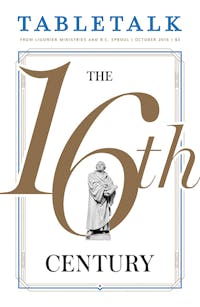
Request your free, three-month trial to Tabletalk magazine. You’ll receive the print issue monthly and gain immediate digital access to decades of archives. This trial is risk-free. No credit card required.
Try Tabletalk NowAlready receive Tabletalk magazine every month?
Verify your email address to gain unlimited access.
God is incomprehensible. But He can be known. How do we reconcile these two truths? By understanding our terms. The doctrine of the incomprehensibility of God does not suggest that we can know nothing about Him, merely that we cannot know everything about Him. It is grounded in the Latin idiom finitum non capax infinitum—”the finite cannot contain the infinite.” The God we worship is infinite, our minds decidedly finite. He is bigger than we are, infinitely so. We need not, however, know everything to know anything. To know in part is to know. What He chooses to reveal is true and knowable.
We run into some of the same tension when we direct our focus to the question of how we have peace with God. On the one hand, such a question is too big for us. It is a question the angels, our intellectual superiors, longed to look into. Even with all eternity before us, we will never grasp all that there is to be known about God’s grace in our lives. On the other hand, however, we not only can but, if we would have peace with God, must be able, if only by His grace, to know something about how we have peace with Him. Sometimes, it seems these two hands push against each other.
Consider the Reformation. It is a scandalous slander against Rome to summarize the battle as between those who believe in works versus those who believe in faith. As Luther and the Counter-Reformation traded blows on the question of how we have peace with God, things got complicated quickly. Rome teaches justification by infusion, the Reformation by imputation. Rome teaches we are declared righteous only when Christ’s righteousness is poured into us as we cooperate with the sacraments. The Reformation teaches that we are declared righteous by the righteousness of Christ accounted to us, coming to us by faith, by trusting in His finished work alone. Is it any wonder that so many want to throw their hands up, to conclude it’s all just too complicated? If one must parse these technicalities in order to make it into the kingdom, who could ever make it? Shouldn’t the gospel be simple enough that even a little child can understand?
It is. All the careful Latin terms, all the footnotes and citations, all the treatises and canons, in the end are but an outworking of this one question: Do you rest in the finished work of Christ alone? Consider Jesus’ parable of the Pharisee and the tax collector. We slander the Pharisee as we do Rome, reading into his prayer a raw, Pelagian works-righteousness. He does indeed think he is better than other men. But his prayer begins, “God, I thank you that I am not like other men.” He recognizes that any goodness in him is from above, just as Rome does. He recognizes his dependence on God’s grace, just as Rome does. His failure is in thinking that God’s good grace has made him good.
The tax collector, on the other hand—his only hope is acknowledging that he has no hope outside the mercy of God. His hope is not grounded in his ability to cooperate with God. Instead, his hope is in the mercy of God alone. “God, be merciful to me, a sinner!” is the essence of the Reformation, sola fide in a parable.
The simplicity of the gospel and its depth, its incomprehensibility, come together precisely because of its very nature—it’s not about me, but about Jesus, not about working but resting, not about cooperating, but about being born from above. This is why Luther so potently saw the connection between justification by faith alone and the bondage of our wills. We were dead, but He made us alive. We are sinners, but He declares us just.
He is, of course, at work in us. We are growing in grace, becoming more and more what we are now declared to be. We do so, however, by entering more fully into the gospel, by remembering that our sin became His, His righteousness became ours—His life for our death, His death for our life.
The Reformation battle over sola fide was no tempest in a teapot. Rome says His grace, as we cooperate, is poured into us. The Reformation boldly affirms that while we were dead in our trespasses and sins, the storm of our Father’s wrath was poured into Jesus for us. It is more than all the difference in the world—it is all the difference in the world to come. Lord, be merciful to me, a sinner.
